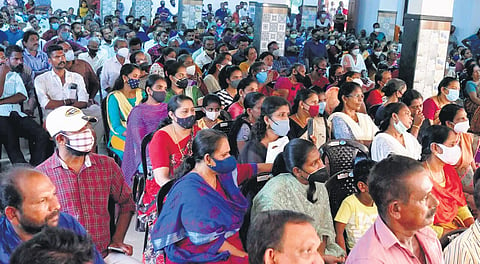

KOCHI: The plight of over 600 families residing in Munambam, who are fighting the alleged unlawful claims of the Waqf Board on the land owned by them, has been brought before the Lok Sabha Secretariat by the Kerala Catholic Bishops’ Council (KCBC) and the Syro-Malabar Public Affairs Commission (SMPAC). In two separate missives, the organisations have expressed their support for the Union government’s proposed amendment of the Waqf laws. On September 27, the residents of Munambam will hold an agitation at Vanchi Square in Fort Kochi.
Both KCBC and the Syro-Malabar Public Affairs Commission have urged the Joint Committee of Parliament on the Waqf (Amendment) Bill to take immediate and decisive action to resolve the issue and ensure that such claims on lawfully owned properties of Indian citizens are not repeated in the future.
“It is the committee’s responsibility to guarantee that the law is enforced fairly and justly, without infringing upon the constitutional rights of citizens to live with dignity and to own property,” said the KCBC and SMPAC missives to the Lok Sabha Secretariat signed by Cardinal Baselios Cleemis and Archbishop Mar Andrews Thazhath, the respective president and chairman of the organisations.
Speaking about the issue that has placed the residents in a quandary, Fr Michael Pulickal CMI, secretary of KCBC’s Commission for Social Harmony and Vigilance, said, “Nearly five years ago, the Waqf Board had laid claim to the areas of Munambam, Cherai, and Pallikal islands in Ernakulam district, located along the northern coast of Vypeen.
This region comprises around 1,000 land titles and is home to more than 600 families of various religious backgrounds, with land ownership records dating back to 1989. These residents are now facing severe hardship as they are being forced to vacate the land they legally purchased. This situation has led to serious human rights violations, infringing on their constitutional rights to live and own property.”
Elaborating on the issue, he said, “The history of ownership of this disputed land dates back to 1902. At that time, the King of Travancore leased 404 acres of land and 60 acres of water to Abdul Sattar Musa Haji Seth, who had come to Kerala from Gujarat for farming purposes. The lease had previously excluded the land of local fishermen who had lived there for many years before it.”
“Later in 1948, his successor Siddique Seth registered this land at Edapally (Ernakulam) Sub-Registrar Office. During the last 50 years, sea erosion led to significant land loss in this region. In particular, torrential rains and rough seas in 1934 completely obliterated a locality ‘Pandara seaside’. A significant portion of this was the land leased by the King to Seth. But, later on, land registered by Seth included areas where fishermen had resided for nearly a century,” he added.
This registered land was handed over to the management of Farook College by Siddique Seth on November 1, 1950, as a gift deed (the construction work of Farook College was started in 1948 at Feroke in Kozhikode district). “However, it was registered at the time under the condition that the management of Farook College should not use that land for any purpose other than educational objectives. If Farook College ceases to exist at any point, the land should be returned to the descendants. But knowingly or unknowingly, the word ‘Waqf’ was written in that document,” said Fr Pulickal.
According to him, even before the transfer of land, some of the residents had obtained occupancy certificates from the taluk office. The locals did so because the certificate would help them get electricity, drinking water, etc. “A few years later, some uneasiness arose between the management of Farook College and the residents due to some disputes over land use. This case continued for several years. Following the assessment that the land had been gifted to Farook College, subsequent court orders were not favourable to the residents,” he said.
But what is the core legal dispute?
Fr Pulickal said, “The main contention before the court is that the present ‘Waqf’ claims cannot stand. Such land cannot be established as ‘Waqf’ as earlier judgments have often referred to the land as a gift to Farook College. According to the 2013 amendments to the Waqf Act, a claim for land to be designated as ‘Waqf’ must be made within three years. However, it was only in 2019 that the Waqf Board raised the claim that the land of Munambam residents is ‘Waqf’. However, no legal procedures had been taken to inform the residents.”
Even the state government has turned its eyes from the plight of Munambam residents, he added. “We urge the Centre to take the grievances raised by Muslim organisations about the Waqf Act amendment seriously. Denial of constitutional rights to any religion should never happen. At the same time, the government must take steps to ensure that incidents like this never occur again. Amendments to the Waqf Act are essential,” he said.
Meanwhile, repeated attempts by TNIE to contact the Kerala Waqf Board chairperson failed to elicit a response.